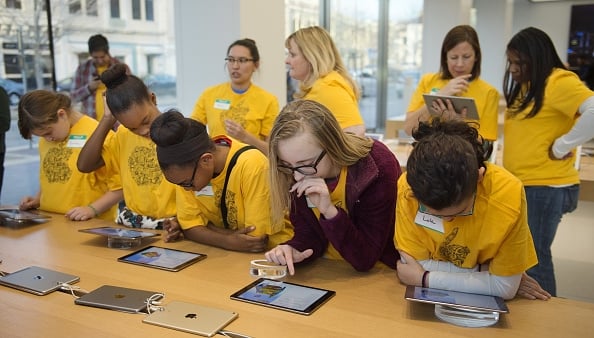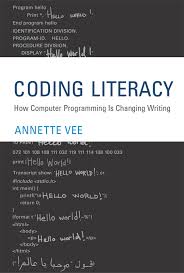You have /5 articles left.
Sign up for a free account or log in.

Members of the Kansas City Girls Can Code club get a lesson on coding on iPads.
Getty Images
The message from many educators, technology industry executives and politicians is clear – everyone should learn how to code. But why?
“As more communication is being conducted through code, we are seeing an increased value on the skills used to code," said Annette Vee, author of Coding Literacy: How Computer Programming is Changing Writing. "It seems that people who are not computationally literate will have to rely on others to help them navigate their lives."
“Because programming is intertwining with writing, it’s changing what it means to be literate in the 21st century," she added. "Computer programming is re-coding literacy.”
To emphasize the universality and importance of computer programming, Vee said the “coding for everyone” call to action draws parallels between reading and writing code and reading and writing text. In an interview with Inside Digital Learning, she said the rhetorical and real connections between coding and literacy show that instructors of writing, language and digital communication also have a stake in coding.
 “One of the main points I make in the book is that programming is too important to be left just to computer science departments,” said Vee, an assistant professor of English at the University of Pittsburgh who specializes in literacy. “It can be taught effectively outside of computer science. If we assume that those who learn to write need to be English majors, we would be in trouble.”
“One of the main points I make in the book is that programming is too important to be left just to computer science departments,” said Vee, an assistant professor of English at the University of Pittsburgh who specializes in literacy. “It can be taught effectively outside of computer science. If we assume that those who learn to write need to be English majors, we would be in trouble.”
In her book published this year, Vee examines the ways that programming is linked with literacy, and looks at how writing and programming encode and distribute information. She explores historical parallels between writing and programming, using the evolution of mass literacy to shed light on the trajectory of coding – first adopted by the U.S. military and federal government, then by businesses and finally by individuals.
Just as societies demonstrated a “literate mentality,” Vee said a “computational mentality” is now emerging even though coding still is considered a specialized skill.
“This is parallel to medieval history,” Vee said in an interview. “Writing was a specialized skill and people became defined by their writing."
The author said there is another historical parallel. During the late 18th and early 19th centuries, people were incentivized to learn to read and write because literacy tests were required to get married and vote.
“If you couldn’t read, you were left out,” Vee noted.
She argues the same is true for coding. “If you don’t know how to program, you can carry on with a perfectly fine life. But this is going to change soon.”
The tech industry and others support that notion. For example, as reported last week in Inside Digital Learning, Apple recently made its App Development with Swift two-semester course available this fall at 30 community colleges. App Development with Swift was designed by Apple engineers and educators to teach students the elements of app design using Swift, Apple's popular programming language used worldwide that tech industry observers say is easy to learn. One community college president took the course – and agrees.
The App Development with Swift course shows students how to code and design fully functional apps, which Apple and community college officials say will help learners gain critical job skills.
A New Perspective
In her book, Vee writes that viewing programing from the perspective of literacy and literacy from the perspective of programing shifts our understanding of both. In an interview, she said she agrees with Yasim Kafai, professor of education at the University of Pennsylvania, and Quinn Burke, assistant professor of education at the College of Charleston, who wrote that “teaching young people introductory programing isn’t about helping them become computer programmers, but to help them become more effective creators and consumers of digital media.”
Vee predicts that possessing basic coding skills will continue to grow in importance. “People say [artificial intelligence] will do things for us,” she said. “But someone has to program the AI. If you think ‘my iPad will do that for me,’ you are punting with your life.”
She said we might begin to see practices built on the assumption that everyone can code. “We can see glimmers of this already. Code-based networks ... are accessible to those that don't have computational literacy, but they still order people according to what I call their 'literate skills.' ”
The web is the most obvious example of a code-based network that relies computational literacy, she said. Since its inception in the early ‘90s, the web has allowed businesses and individuals to put information online with the simple-to-use Hypertext Markup Language, or HTML. But much of this work still is done by tech firms.
"Soon those of us who can build a site or customize a WordPress template may have an advantage over those who outsource those tasks,” Vee said.
Why Write About Coding?
 Vee, 40, said she represents the demographic that was turned away from computer science. “I learned BASIC [programming language] in elementary school,” she said. “Then I hit puberty and computers were thought to be for boys.”
Vee, 40, said she represents the demographic that was turned away from computer science. “I learned BASIC [programming language] in elementary school,” she said. “Then I hit puberty and computers were thought to be for boys.”
After completing an undergraduate degree in English, Vee worked in an administrative role for a computer game developer that employed 50 men and two women. She said a couple of the guys taught her some programming. “I felt sad I dropped this.”
Vee went on to get a Ph.D. in English, specializing in literacy. She said she began making the connection between literacy and coding around 2007, and then a few years later became familiar with organizations like Black Girls Code, Code.org and other nonprofits working to expand access to coding instruction, especially for women and underrepresented minorities.
In her book, Vee quotes Ali Partovi, co-founder of Code.org, who said: “We felt that coding is the new American Dream and should be available to everybody, not just a lucky few.”
Vee writes that for all their faults, mass literacy campaigns and formal schooling helped woman and underserved groups gain access to literacy – and those types of efforts are needed for everyone to learn to code.
“Thinking of coding as a literacy gives us access to new ways of teaching programming and thinking about its role in our lives,” she said in an interview. “If enough people say that coding is literacy, and that non-coders are left behind, then they will be pushed behind not only by their lack of skills but also by the rhetoric.”
While Vee believes coding instruction should start in elementary school, she wants to see it expanded on the college level. “We need more coding across the curriculum,” she said. “One way is to embed it, as we do with writing. Writing isn’t just the provenience of the English department.”




